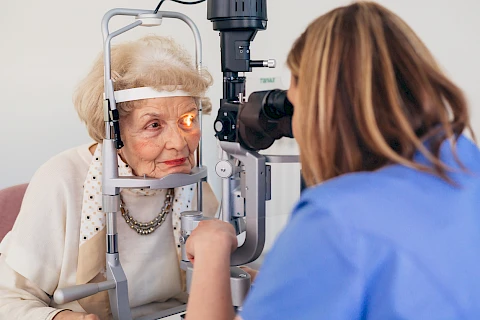
Our bodies experience various changes as we age, including those affecting our eyes. Glaucoma in seniors is a leading cause of blindness, so raising awareness is crucial because early detection and proper treatment can help prevent severe eyesight loss.
What is Glaucoma?
Optic neuropathy is a group of eye conditions that can damage the optic nerve, often due to high pressure within the eye. Glaucoma has a few types, each with unique progression and symptoms.
Open-Angle
This is the most common type of optic neuropathy, characterized by a gradual and painless loss of peripheral sight. It often develops slowly without noticeable signs, making prompt recognition crucial.
Angle-Closure
A more severe form occurs when the drainage angle for fluid in the eye suddenly becomes blocked, causing a rapid increase in eye pressure. This condition requires immediate medical attention.
Risk Factors for Older Adults
Certain factors can increase the risk of developing glaucoma, especially in elderly retirees:
- The risk of optic nerve damage rises as one nears their golden years.
- Conditions like diabetes and hypertension can raise your risk.
- If someone in your family has glaucoma, you are at a higher risk.
- African Americans, Hispanics, and Asians are at higher risk for certain types of optic nerve impairment.
Recognizing the Symptoms
Optic neuropathy is the "silent thief of sight" because it usually has no early manifestation. However, there are some signs and manifestation to watch for:
- Gradual loss of peripheral (side) vision, usually in both eyes
- Tunnel vision in the later stages
- Eye pain, redness, or sudden eyesight changes in the case of angle-closure glaucoma
Importance of Early Detection
Regular eye checks are essential for the prompt recognition of optic nerve damage, especially in elderly loved ones, who should undergo a comprehensive eye exam every 1 to 2 years. Timely diagnosis enables timely action, slowing or preventing the condition's progression and reducing the risk of blindness.
Medical Options for Optic Nerve Damage
If you are diagnosed with glaucoma, various restorative options are available to manage the condition.
- Eye drops are often the first line of remedy, and help reduce eye pressure.
- Laser therapy can open fluid channels in the eye and helps reduce pressure.
- Surgical procedures may sometimes be necessary to improve drainage and decrease eye pressure.
Adhering to your prescribed medical plan without skipping medications or delaying treatment is crucial to prevent further eye damage.
Living With Optic Neuropathy
Managing glaucoma in seniors necessitates certain lifestyle modifications, yet strategies exist to handle daily activities effectively. Here are a few suggestions:
- Take your medications regularly and as prescribed by your doctor.
- Use assistive devices like magnifying glasses and good lighting to help with tasks.
- Inform your friends and family about your condition so they can offer support.
- Join support groups and access resources for people living with optical nerve deterioration.
Are You at Risk of Developing Glaucoma?
Awareness of glaucoma in seniors is crucial for preventing loss of eyesight. Contact us at Senior Helpers Chestnut Hill if you or a loved one in Philadelphia, Bala Cynwyd, Chestnut Hill, Narberth, or Montgomery County needs assistance managing glaucoma or other health concerns. We provide compassionate and professional support for older adults